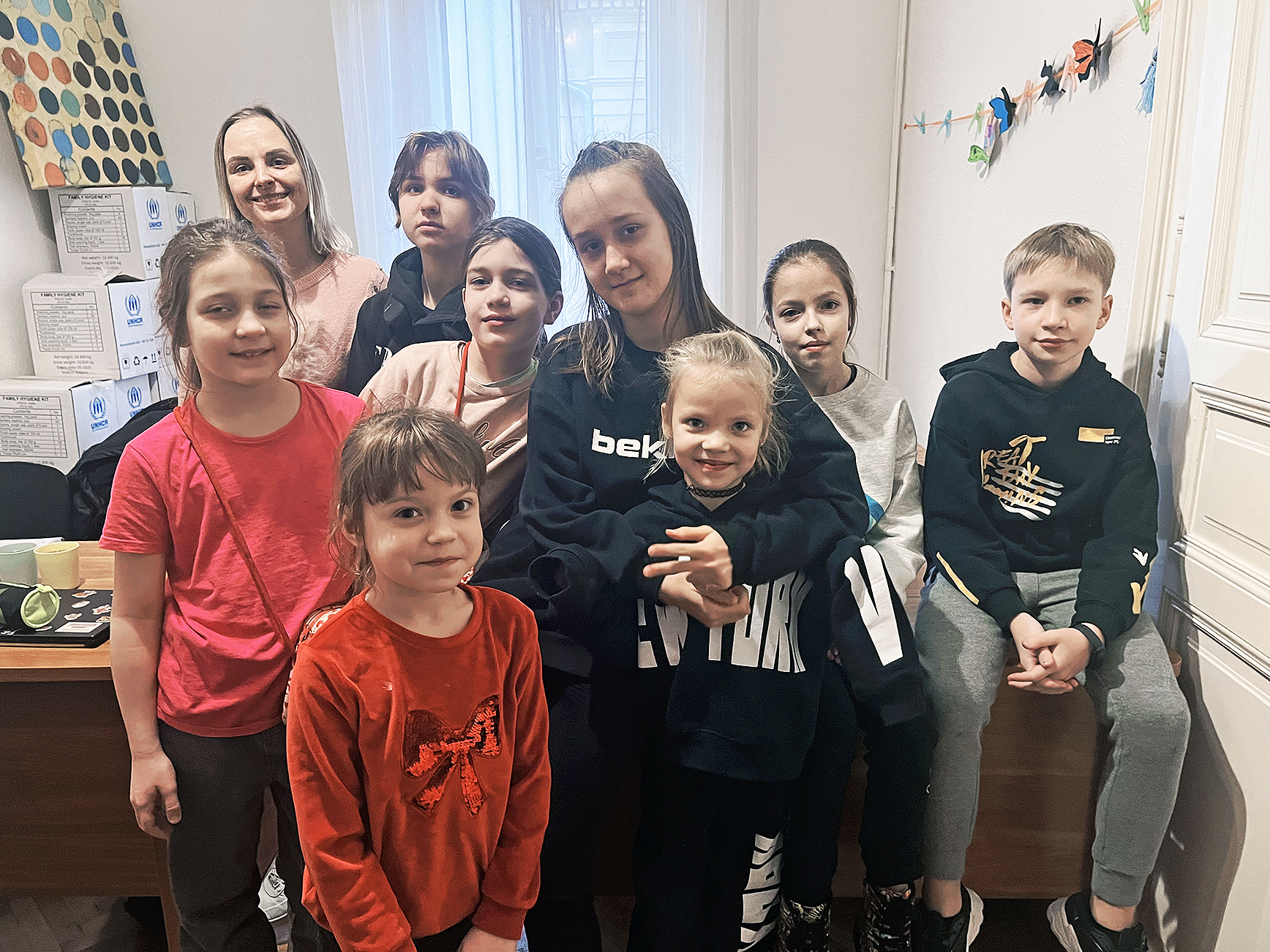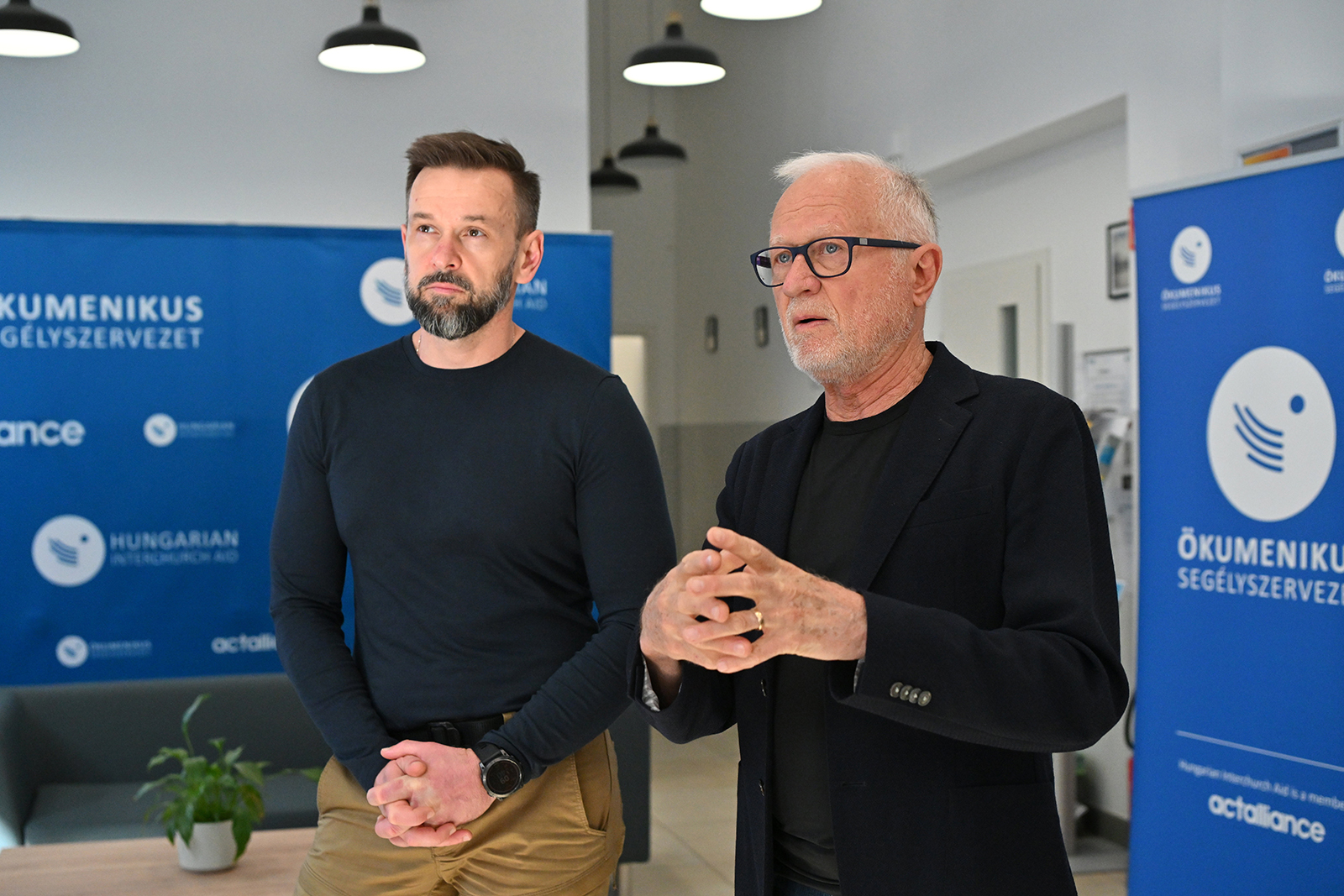A School, Home and Joyful Refuge for Displaced Ukrainian Children

Teacher and Ukrainian refugee Anna Buzadzhy (back row, far left) with Kateryna Yuhas beside her. Oksana Bohdanova is in the center of the front row, holding a younger girl.
Photo by Kester Eddy.
A small, dedicated team of educators helps relieve the difficulties of Ukrainian children in maintaining their schooling and lives in Budapest.
On a grey February afternoon, Oksana Bohdanova, aged 11, is awaiting the start of an English class in a modest flat in Budapest’s Józsefváros district
On a wall above are paintings and drawings, one showing buildings engulfed in flames, another a dark grey ship, a large letter “Z” on the side, sinking beneath the waves.
Yet another image is a map of Ukraine, dotted with hearts across the country. One is drawn over Kharkiv, Ukraine’s second city. It is in the far northeast of the country, a mere 40 km from the frontier with Russia. It is Oksana’s former home.
This is Ukrainian Space, an association founded soon after the full-scale Russian invasion of its western neighbor, where a small team of dedicated staff help kids like Oksana keep up with their education in their mother tongue. But it’s more than just an alternative, auxiliary, voluntary school.
“We believe it’s really a home for the kids and the parents who let them come here. We study together here, we try and give them psychological assistance, and also they teach us a lot,” says Hanna Danylenko, a co-founder of the association and teacher of math and biology.
She is one of three staff and four visiting educators who teach subjects from Ukrainian language and literature to geography, history, English and Hungarian to about 40 students. Some, such as Oksana, attend daily in addition to her regular morning school. Others come for one class a week.
With just two classrooms, the kids have to study with a mix of ages, ranging from preschool (aged four to six) through juniors (seven to 10) to seniors (10-14).
“Quite often, it is hard to teach children simultaneously from different forms, but, in our case, the younger kids often listen to what is being said to their elders, and they can sometimes grasp, maybe, some complicated things [in advance]. And older kids are revising what they were taught two or three years ago, and this also helps,” says Danylenko.
War and COVID
Indeed, because of the war and COVID restrictions, many kids have not had “normal” classes for four years, so older children, in particular, can benefit from revisiting earlier parts of the curriculum.
Whether revising or pioneering new knowledge, the dedication and sheer doggedness of many pupils, some of whom may be in classes for up to nine or 10 hours a day, has amazed the staff.
“I’m astonished because they like to study. They all come from their respective Hungarian or online Ukrainian schools, with home assignments. Their motivation is that they don’t understand what they were told at the morning school, but they want to understand it,” she says. Moreover, the kids, in many cases, exhibit a maturity and responsibility beyond their years.
“They realize that if they start to lag behind the curriculum, their parents will have to pay for tuition, while here they get this knowledge free of charge. Some of their parents are “over-educated” here in Hungary, a teacher may be washing dishes in a restaurant or a professional engineer doing some [simple] assembly work because they don’t speak Hungarian,” Danylenko says. “They don’t want to be a future burden on their parents,” she adds.
Like Oksana, Kateryna Yuhas, aged 14, attends Ukrainian Space daily, usually for three classes. Asked what she studies, her reply is simple: “Whatever I am taught! I study everything they teach here.”
Originally from Uzhhorod, western Ukraine, she switches to English for a few words to express why she works so hard. “I feel happy when I’m here,” then reverting to Ukrainian for the complicated parts: “I love being with people with whom I can speak, the kids and the teachers as well. All the people around me here.”
But what about the scars of war and the need for psychological treatment? That is no longer so necessary, Danylenko says.
“It used to be quite an issue at the beginning. Now, what most of the kids need is just getting adapted to the Hungarian environment. The kids are more optimistic; they are able to see good things and to feel happy where adults still cannot think there is anything to be happy about.”
Coping Mechanism
Oksana seems to be a case in point. During the first year of the conflict in Kharkiv, she survived a Russian attack hiding, with her parents, in the inside corridor of a high-rise block when a missile struck the neighborhood, destroying a shopping mall. Was she afraid? The question seems almost fatuous.
“A little bit. It was very loud. But more than that, I wanted to drink tea,” she recalls.
But, Danylenko admits, there are surely problems lurking deeper in many of those in her charge, as some might infer from the artwork on the wall.
“One of our girls learned, some two months ago, that her grandfather had been killed in the Zaporizhzhia region. He was taken to a jail by Russian soldiers because he openly showed his dissent with the new administration, and later shot. He was 76. We have quite a few such stories,” she says.
The effects of such traumas will likely take some time to work through, assuming they ever do. At least for now, Oksana appears to be the embodiment of stoicism.
“I come to the school because it’s Ukrainian Space here in Budapest. It’s a sort of shelter, a home, and people around who understand me, because the Hungarians don’t understand me at all,” she says.
As to whether the workload from two schools is too much, she responds breezily, “I still have days off, Saturday and Sunday, every week.”
Hearing this, from across the room, Kateryna, seemingly not wanting to be outdone in the diligence rankings, chips in: “I have three schools, and I don’t complain.”
Keeping Ukrainian Space Solvent
Like any operation, even those run on a shoestring, Ukrainian Space needs support. The association relies on a small band of private donors and, at different times or for specific projects, has gained assistance from Bálint Ház, the Jewish Community Center in Budapest, and the Calvinist (Református) Church of Hungary.
But the staunchest support has come from the Saint Margaret of Scotland Anglican Episcopal Church in Budapest.
“[Church] Councilor Gordon Cross brought his hope and plan to council to assist arriving Ukrainian families and their children with after-school activities in their native language, help with Hungarian and other Western European languages, assistance with schoolwork, and counseling support where needed,” the Rev. Frank Hegedus, the chaplain of St. Margaret’s tells the Budapest Business Journal.
The church council swung into action and was also instrumental in bringing Ukrainian Space’s needs to the United Society Partners in the Gospel (USPG), a United Kingdom-based charitable organization, which has since been able to offer significant additional funding.
“Ukrainian Space also assists parents in navigating life in Hungary. The center and its staff have become good friends of Saint Margaret’s, and we continue to offer help and support as we can,” says Hegedus.
This article was first published in the Budapest Business Journal print issue of March 8, 2024.
SUPPORT THE BUDAPEST BUSINESS JOURNAL
Producing journalism that is worthy of the name is a costly business. For 27 years, the publishers, editors and reporters of the Budapest Business Journal have striven to bring you business news that works, information that you can trust, that is factual, accurate and presented without fear or favor.
Newspaper organizations across the globe have struggled to find a business model that allows them to continue to excel, without compromising their ability to perform. Most recently, some have experimented with the idea of involving their most important stakeholders, their readers.
We would like to offer that same opportunity to our readers. We would like to invite you to help us deliver the quality business journalism you require. Hit our Support the BBJ button and you can choose the how much and how often you send us your contributions.








